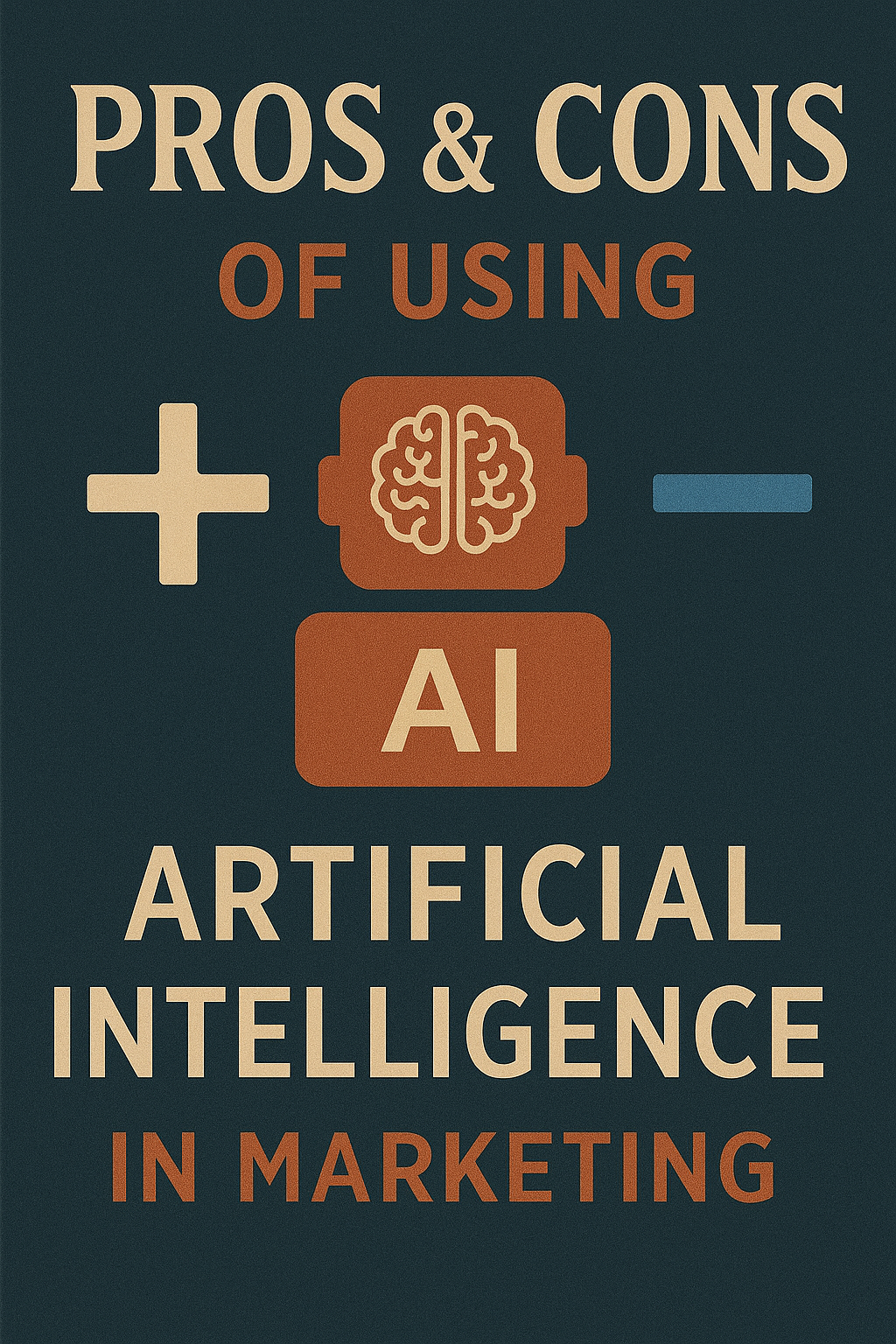Artificial Intelligence (AI) has moved from being a futuristic concept to a vital part of marketing today. Businesses now use AI to automate tasks, analyze consumer behavior, and optimize advertising strategies—faster and smarter than ever before. With the help of artificial intelligence solutions, marketers can transform how they target, engage, and convert audiences. However, while AI brings undeniable benefits, it also comes with some limitations that every business should carefully consider.
In this blog, we’ll explore the top advantages and disadvantages of using AI in marketing and help you decide how to integrate it into your own business strategy.
Using Artificial Intelligence in Marketing
1. Advantage: Hyper-Personalization at Scale
One of the most impactful uses of AI in marketing is its ability to give personalized experiences to customers at scale.
- AI analyzes large sets of user data to tailor messaging in real-time.
- Algorithms predict what a user will possibly click, buy, or ignore.
- Personalization extends to websites, landing pages, and email marketing campaigns.
This kind of personalization increases engagement, boosts ROI, and builds customer loyalty—especially when paired with automated tools like AI-driven CRMs or smart content platforms.
2. Disadvantage: Data Privacy and Ethical Concerns
AI’s effectiveness hinges on data—but that data often includes sensitive customer information.
- Improper management of personal data can lead to legal issues under GDPR or CCPA.
- Customers may feel uneasy when ads or content feel “too personal.”
- Biased data sets can lead to discriminatory outcomes in automated decisions.
To responsibly use AI, businesses must invest in transparent data practices and strong cybersecurity protocols.
3. Advantage: Enhanced Efficiency Through Automation
AI can dramatically streamline repetitive tasks, saving both time and resources.
- Automates content scheduling, ad placements, and customer segmentation.
- Chatbots manage basic support tasks, lead qualification, and appointment booking.
- PPC advertising management becomes more precise with AI-powered bidding.
This enables marketing team players to focus on strategy, creativity, and growth rather than executional bottlenecks.
4. Disadvantage: Loss of Human Touch
While AI can automate and personalize, it lacks the nuance and empathy of human interaction.
- AI-generated content may feel robotic or generic.
- Chatbots can misinterpret intent, frustrating users.
- Emotion-driven brand messaging often requires a human voice.
For best results, AI should enhance—not replace—human creativity and oversight.
5. Advantage: Predictive Analytics for Smarter Decisions
AI systems can analyze trends and predict future outcomes based on historical data.
- Marketers can forecast customer behavior, campaign performance, and market trends.
- AI identifies high-converting keywords or channels before campaigns launch.
- Supports better audience targeting and resource allocation.
When aligned with CRM integration services, predictive analytics can ensure both sales and marketing are working in harmony.
6. Disadvantage: High Initial Investment and Maintenance
Advanced AI solutions may require significant up-front investment.
- Licensing AI software or tools can be expensive.
- Implementation may require staff training or external consultants.
- Long-term ROI depends on proper configuration and ongoing optimization.
Smaller businesses often benefit from third-party platforms or digital transformation consulting instead of building solutions from scratch.
7. Advantage: 24/7 Customer Service with AI Chatbots
AI-powered chatbots are now a standard in digital marketing for good reason.
- They provide immediate answers to FAQs.
- Can guide users through the buyer journey on your website.
- Integrate with CRMs for personalized user experiences.
Agencies offering chatbot development services enable businesses to keep communication open day and night—without overburdening staff.
8. Disadvantage: Lack of Contextual Understanding
Chatbots and AI assistants often fail when conversations go off-script.
- Misunderstand user intent in complex queries.
- Provide limited or incorrect responses.
- Cannot effectively resolve high-emotion or sensitive issues.
A hybrid model—using chatbots for Tier 1 support and humans for escalation—tends to perform best.
9. Advantage: Scalable Content Creation
AI writing tools can produce emails, headlines, product descriptions, and social media posts at scale.
- Marketers can generate hundreds of content variations in seconds.
- Supports A/B testing and dynamic creative optimization.
- Assists in SEO by producing keyword-rich content.
This scalability is ideal for large campaigns or brands using content-heavy strategies like automated email marketing campaigns or social posts.
10. Disadvantage: Content Overload and Duplication
With so many companies using AI for content creation, there’s a risk of saturation.
- AI-generated content can feel repetitive or unoriginal.
- Poor-quality outputs may damage brand credibility.
- It can negatively affect search engine rankings if not reviewed.
Always pair AI-generated content with human editing to maintain tone, voice, and authenticity.
11. Advantage: Real-Time Data and Performance Tracking
AI can track campaign results in real time and adjust tactics accordingly.
- Dynamic dashboards offer instant visibility into KPIs.
- AI tools auto-adjust ad spending based on performance.
- Insights can be used to enhance SEO, email, or PPC campaigns quickly.
These capabilities are essential for fast-moving industries and help businesses remain agile.
12. Disadvantage: Complexity and Lack of Transparency
Some AI tools, especially black-box models, don’t provide insight into how decisions are made.
- Marketers may struggle to explain AI-driven results to stakeholders.
- Harder to audit or troubleshoot when problems arise.
- Could lead to mistrust if consumers feel manipulated.
Whenever possible, choose AI systems with explainability or transparent frameworks.
Final Thoughts: Is AI in Marketing Worth It?
Yes—when used thoughtfully.
Artificial Intelligence offers tremendous benefits to marketing teams: scalability, efficiency, insights, and automation. But the technology is not flawless. It requires oversight, strategic implementation, and a strong ethical foundation.
For companies new to AI or seeking support, SpeedDot360 offers expert services, including:
- Artificial intelligence solutions personalized to your business needs
- Digital transformation consulting to align tech with growth
- CRM integration services for unified marketing and sales
- Chatbot development services for smarter customer support
- Custom software development for AI-powered applications
- PPC advertising management that’s results-driven and data-backed
AI is a tool—and like all tools, its value depends on how you use it. Leverage it wisely, and it can become one of your most powerful marketing assets.





